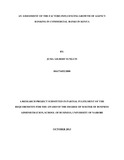| dc.description.abstract | This study sought to assess the factors influencing growth of agency banking within the Kenya
banking industry. Agency banking was commissioned in Kenya in May 2010. The use of the
agency banking model by banks in Kenya has continued to improve access to banking services
and has also increased financial deepening in the country. The financial sector has recorded a
tremendous growth with most Kenyans accessing finances at their convenience. This has reduced
the cost of transaction and the time especially for the Kenyans in remote areas. The study was
guided by the research objective which was to determine factors that affect growth of agency
banking in Kenya. The study was a descriptive survey and the population consisted of all 13
commercial bank that had been licensed to offer agency banking in Kenya by September 2013.
The variables included as predictors included: percentage agent commission, value of agent
transaction, number of agent transactions, and number of bank customers. Multiple linear
regression model was adopted to investigate relationship between predictor variables and number
of bank agents. ANOVA analysis indicated that the model was significant for that data used (F4,
31=1684.983, p < 0.0005). Regression analysis also established that all variables significantly
influenced growth of agent banking in Kenya with p-value <0.05 for all predictor variables with
their coefficient being positive as follows: 187.75 for Agency commission, 18.561 for value of
agency transaction, 102.780 for number of agent transactions , and 644.836 for number of
customers. The study established that agency banking has been growing significantly both in
terms of number of agents and value of transactions. The growth rate is expected to be
maintained as more and more banks within the industry enroll agents especially in remote
arrears. It was also concluded that agents’ commission, number of agent transaction, value of
transactions and number of customers are among the factors that have contributed to growth of
agent banking in Kenya. Finally, the study recommends that banking institutions embrace agency
banking as an alternative to traditional branch banking. Secondly, banking institutions should
review agency commission with an aim of making transactions done through agent more
affordable to consumers. This will promote agency banking growth and reduce the banks
operational cost. | en |

